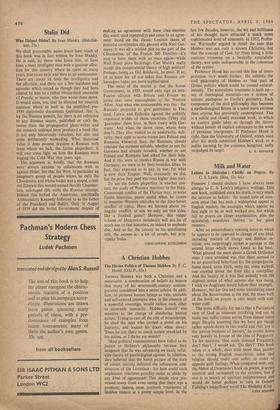Stalin Did
WE shall presumably never know how much of this book was in fact written by Ivan Maisky. He is said, by those who knew him, to have been a most intelligent man with a genuine affec- tion for this country where he spent so many years, first as an exile and then as an ambassador. There are traces of both the intelligence and the affection, and there are a few incidents and episodes which sound as though they had been related by him to a rather obtuse hack journalist of Pravda, or worse, who then wrote them down. It would seem, too, that he directed his research assistant where to look in the published pre- 1939 diplomatic documents (published, that is, by the Western powers, for there is no reference to any Russian source, published or not). Be- tween them the propagandist ghost-writer and the research assistant have produced a book that is not only historically valueless, but also and quite deliberately misleading. What historical value it does possess requires a Russian verb tense which we lack, the future pluperfect: it will cast some light on how the Russians were waging the Cold War two years ago.
The argument is, briefly, that the Russians were always anxious to collaborate with us against Hitler, but that the West, in particular an imaginary group of people whom he calls the Clivedenites and whose leader was a stupid, crimi- nal illiterate (his words) named Neville Chamber- lain, sabotaged (his verb) the Russian attempt. Behind this lurked the Americans, specifically Ambassadors Kennedy (referred to as the father of the President) and Bullitt. Only in August of 1939 did the Soviet Government despair of making an agreement with these class-enemies (his word, used repeatedly) and come to an agree- ment based on the classic Leninist thesis of peaceful co-existence (his phrase) with Nazi Ger- many. It was all a wicked plot on the part of the Clivedenites, of the French 200 Families—it's nice to have them with us once again—while Wall Street plots backstage. Cap. Maisky really accept this conspiratorial theory of high politics? Perhaps, being an Old Bolshevik, he must. If so, let us hope for all our sakes that Russian am- bassadors today are more sophisticated.
The meat of the matter is that the Soviet Government, in 1939, would only sign an anti- Fascist alliance with Britain and France on terms that were unacceptable to the Western Allies. And what was unacceptable was this: the Russians proposed to give guarantees to Fin- land, Latvia and Esthonia against the publicly expressed wishes of those countries. (They did 'guarantee' them later, in their treaty with Ger- many. And when the dawn came, where were they?) They also wished us to underwrite, mili- tarily, their right to move troops into Poland and Rumania whenever they, the Russians, should consider the moment suitable, whether or not the Germans had already invaded, whether or not Poland and Rumania had asked for their help. And if this were to involve Russia in war with Germany, we were to be their bounden allies. In fact, they expected us to pay, in war, for what is now their Empire. Well, eventually we did, but the price they paid was even higher than ours.
To use the future pluperfect in another con- text, the study of Western reactions to the Nazi- Communist conflict of the Thirties may, to some future historian, prove useful when he comes to examine Western attitudes to the Sino-Soviet conflict of today. Have we learned about tri- angular conflict, or can we only see two sides, like a football game? However, this vulgar volume of Muscovite mendacity will not be of much use to that historian, or indeed to anybody else. And as for the answer to his questioning title, the answer is: a lot of people, but prin- cipally Stalin.
CONSTANTINE FITZGIBBON


































 Previous page
Previous page